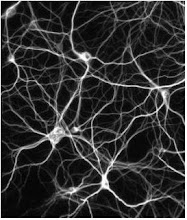My posting has been very very sporadic of late. My computer died and I've yet to get it fixed. Ah the life of a college student. I have been writing every day though. There are a lot of interesting things happening to me, and though the presumption is a bit egotistical, I bet you'd like to hear about them.
I'm on new drugs. Taking Seroquel. We're still working up to a normal dose but I feel better and friends are taking note. The fact that I can actually chose what to work on rather than being at the whim of mood and inspiration is very odd. I've been taking time to get used to not being nervous about the next coming episode. There's just a whole lot of stuff that I'm still getting used to.
I could explain more, but I've been thinking other interesting things that are more interesting to everyone else. I don't feel so hopeless anymore. Though I still don't believe in a god and I still don't really feel like life has any meaning, I haven't been feeling so hopeless. I haven't felt as blown about on the winds of time and space.
All the things I wrote while I felt that way show a lot. I don't know how accurate or inaccurate the things I though were, but it's certainly interesting to see what I was thinking in the past. It's a different sort of revision now. Before this looking back at things I had written was a study in differing writing style and growth as a human being, now it's more like reading things written by an entirely different person who I happen to have the memories of.
All of this has also given me a differing view on the way memory works. Of course I've been taking courses on exactly that topic as well, so I know better how it actually works, but I've also had these philosophical thoughts about it. That sureness, and lack of sureness that memory has is something I'm rather enthralled by. The fact is that we know only our current state. What is now is all that is. I think I can finally finish reading Swan's way, and the other volumes of "À la recherche du temps perdu" (or Remembrance of things past) The insights that it has about memory, and its sheer size are a few things that interest me.
I've had some of those Proustian thoughts myself. The ones about memory being held in time isolated from other events. It's all of interest to me more now than it was before, because being well and remembering not being well is a surreal experience. The things remembered take on a movie like quality.
I remember tics and gestures I used to do, and I remember being curled up in the foetal position on a bed, but I don't always feel like those people are me. That's the leap that we all make, that these things we remember really happened to us. It's an easy leap to make, and logically solid, but it still is a leap. That's where all of this coalesces into one problem.
It's the same damn question we as a species have been asking since the advanced development of our forebrain. Who am I. If my memories don't define me, because they are only me in as much as I admit they are, then what does? If my actions now become but memories later, then are they important either?
That's the thing. I can't really say if the zen living in the moment is really the best way to go or if the western Sartrean existentialist equivalent is a solution. I don't know if there is a positive thing about our existences, and I don't know if now that I'm well enough to continue on in a way that isn't horrible tumultuous I'll have enough good to outweigh the bad.
That's the problem, the answers don't come. In what I study, the brain and its workings, I don't get to find out what meaning there might be. I'm given more things to mull over, but I'm never given a large number of explanations. That's where I hit a wall. These questions that we ask are nigh unanswerable.
I'm awfully tempted to take the Wittgenstein view that we're just asking the wrong questions. That's a significant idea. Asking what it all means may not be a question that makes sense. An object doesn't mean anything. A state of existence doesn't mean anything. We associate our words with semantic quatility, do we also then associate what they refer to with semantic quality? I'd guess that we do. We want to construct meaning out of our memories, and out of the objects in our world, and out of our lives, but the fact is that meaning may not be applicable to these entities. That's where we may fail, this application of a human construction on something beyond us, be it life, or memory, or whatever else.
Subscribe to:
Post Comments (Atom)

No comments:
Post a Comment